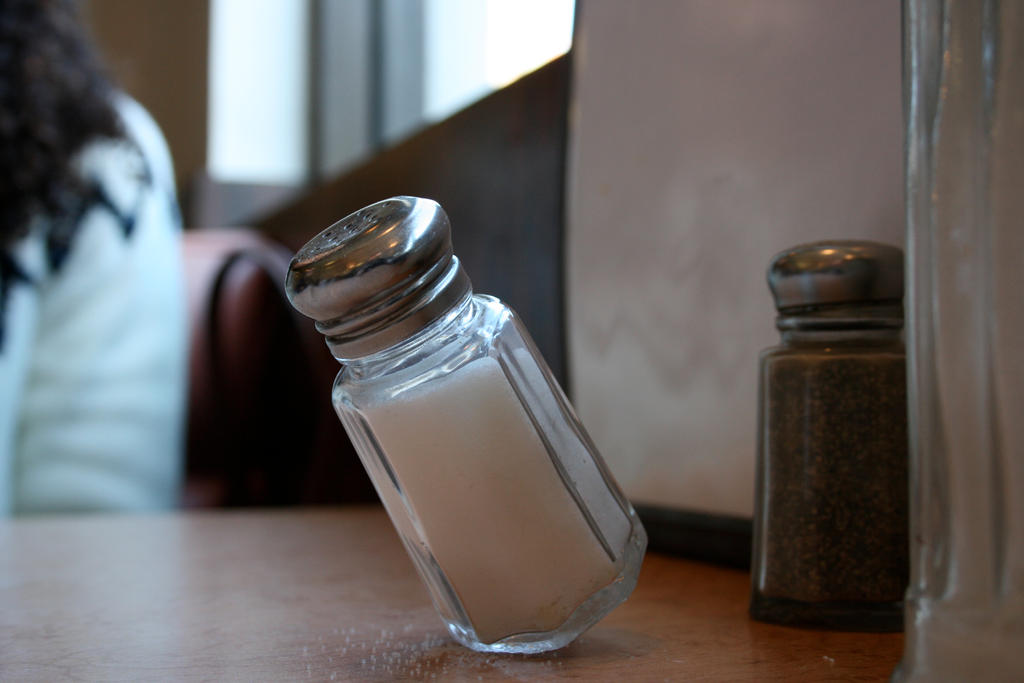Does The Salt Trick Really Work? Unveiling The Truth Behind This Popular Remedy
Does the salt trick really work? This question has been debated among health enthusiasts, scientists, and curious individuals for years. The so-called "salt trick" refers to consuming a mixture of salt and water to address various health concerns, including dehydration, electrolyte imbalance, and even hangovers. While some swear by its effectiveness, others remain skeptical. In this comprehensive guide, we'll explore the science behind the salt trick, its potential benefits, and whether it's worth trying.
With the rise of wellness trends and DIY remedies, the salt trick has gained significant attention. Proponents claim it offers a simple, cost-effective solution to several health issues. However, before jumping on the bandwagon, it's crucial to understand the facts and separate myth from reality. This article aims to provide you with the most accurate and reliable information to help you make an informed decision.
As we delve deeper into this topic, we'll examine the origins of the salt trick, its mechanisms, and the potential risks associated with it. Whether you're a skeptic or a supporter, this guide will equip you with the knowledge you need to determine if the salt trick is right for you.
Read also:Discover The Beauty Of Charlotte Parks A Comprehensive Guide To Outdoor Adventures
What Exactly is the Salt Trick?
The salt trick involves consuming a solution made by dissolving salt in water. Advocates claim this mixture can restore electrolyte balance, rehydrate the body, and alleviate symptoms of dehydration or fatigue. While the concept seems straightforward, the science behind it is more complex than it appears.
Historically, salt has been used for centuries in various cultures as a remedy for health issues. From ancient Ayurvedic practices to modern-day sports drinks, the importance of electrolytes in maintaining bodily functions is well-documented. However, the modern version of the salt trick often involves drinking a concentrated salt solution, which raises questions about its safety and efficacy.
How Does the Salt Trick Work?
Understanding Electrolytes and Their Role in the Body
Electrolytes are essential minerals that regulate numerous bodily functions, including muscle contractions, nerve signaling, and fluid balance. Sodium, one of the primary electrolytes, plays a critical role in maintaining hydration and preventing dehydration. When you consume salt, it helps your body retain water, which can be beneficial in certain situations.
Here are some key points about electrolytes:
- Sodium is the primary electrolyte found in salt.
- Electrolytes help maintain proper fluid balance in the body.
- Dehydration can lead to an imbalance of electrolytes, causing symptoms like fatigue, dizziness, and muscle cramps.
The Science Behind the Salt Trick
When you consume a saltwater solution, the sodium in the salt helps your body retain water, which can be particularly useful in cases of mild dehydration. However, the effectiveness of the salt trick depends on several factors, including the concentration of the solution and the individual's overall health.
Research shows that consuming saltwater in moderation can help restore electrolyte balance, but excessive intake can lead to adverse effects. For instance, a study published in the Journal of Clinical Hypertension highlights the risks of consuming too much sodium, particularly for individuals with high blood pressure.
Read also:Transform Your Look The Ultimate Guide To Pushup Bra Before After Results
Does the Salt Trick Help with Dehydration?
Dehydration occurs when your body loses more fluids than it takes in, leading to an imbalance of electrolytes. While the salt trick can help restore sodium levels, it's not a complete solution for dehydration. Drinking plain water or electrolyte-rich beverages like coconut water or sports drinks may be more effective in severe cases.
Here are some tips for staying hydrated:
- Drink water regularly throughout the day.
- Incorporate electrolyte-rich foods like bananas, avocados, and spinach into your diet.
- Limit caffeine and alcohol intake, as they can contribute to dehydration.
Can the Salt Trick Cure Hangovers?
The Connection Between Salt and Hangovers
Hangovers are often caused by dehydration and electrolyte imbalance, which is why some people turn to the salt trick as a remedy. While consuming saltwater may help alleviate mild symptoms, it's not a guaranteed cure. In fact, excessive alcohol consumption can disrupt your body's ability to process sodium, making the salt trick less effective.
A study published in the Journal of Alcohol and Alcoholism suggests that rehydrating with a balanced electrolyte solution may be more beneficial than relying solely on saltwater. Combining water, salt, and other electrolytes can help restore balance and reduce hangover symptoms.
Alternative Remedies for Hangovers
Instead of relying solely on the salt trick, consider these alternative remedies:
- Drink plenty of water before going to bed after a night of drinking.
- Consume electrolyte-rich beverages like sports drinks or coconut water.
- Get plenty of rest to allow your body to recover.
Is the Salt Trick Safe for Everyone?
While the salt trick may offer benefits for some individuals, it's not suitable for everyone. People with certain health conditions, such as high blood pressure, kidney disease, or heart problems, should avoid consuming excessive amounts of salt. Additionally, consuming too much salt can lead to adverse effects, including water retention, bloating, and increased blood pressure.
Here are some precautions to keep in mind:
- Consult your doctor before trying the salt trick, especially if you have pre-existing health conditions.
- Limit your salt intake to the recommended daily allowance, which is about 2,300 mg for most adults.
- Monitor your body's response to the salt trick and adjust your intake accordingly.
How to Perform the Salt Trick Safely
Preparing the Saltwater Solution
To perform the salt trick safely, it's essential to prepare the solution correctly. Here's a step-by-step guide:
- Start with a glass of water (about 250 ml).
- Add 1/4 to 1/2 teaspoon of salt (approximately 1-2 grams).
- Stir the mixture until the salt dissolves completely.
- Drink the solution slowly to allow your body to absorb the electrolytes.
Tips for Maximizing Effectiveness
Here are some tips to enhance the effectiveness of the salt trick:
- Combine the saltwater solution with other electrolytes like potassium or magnesium for better results.
- Drink the solution in moderation and avoid overconsumption.
- Pair the salt trick with a balanced diet rich in fruits and vegetables to support overall health.
Common Myths About the Salt Trick
Despite its popularity, the salt trick is surrounded by several myths and misconceptions. Here are some common myths debunked:
- Myth 1: The salt trick can replace sports drinks. Fact: Sports drinks contain a balanced mix of electrolytes, making them more effective than plain saltwater.
- Myth 2: The salt trick is safe for everyone. Fact: Certain individuals, particularly those with high blood pressure or kidney disease, should avoid excessive salt intake.
- Myth 3: The salt trick is a guaranteed hangover cure. Fact: While it may help alleviate mild symptoms, it's not a complete solution for hangovers.
Scientific Evidence Supporting the Salt Trick
Several studies have examined the effects of saltwater consumption on hydration and electrolyte balance. A study published in the Journal of Applied Physiology found that consuming a saltwater solution can help improve hydration status in athletes during prolonged exercise. Another study published in the Journal of Nutrition highlighted the importance of sodium in maintaining fluid balance and preventing dehydration.
However, it's important to note that excessive salt intake can have adverse effects on health. A meta-analysis published in the Journal of the American Heart Association linked high sodium consumption to an increased risk of cardiovascular disease and hypertension.
Conclusion
In conclusion, the question of "does the salt trick really work?" can be answered with a qualified "yes, but with caution." While the salt trick can help restore electrolyte balance and alleviate mild dehydration, it's not a one-size-fits-all solution. Its effectiveness depends on various factors, including the concentration of the solution, individual health conditions, and overall lifestyle.
We encourage you to share your thoughts and experiences in the comments section below. If you found this article helpful, don't forget to share it with your friends and family. For more informative articles on health and wellness, explore our website and stay updated on the latest trends and research.
Table of Contents
Article Recommendations


